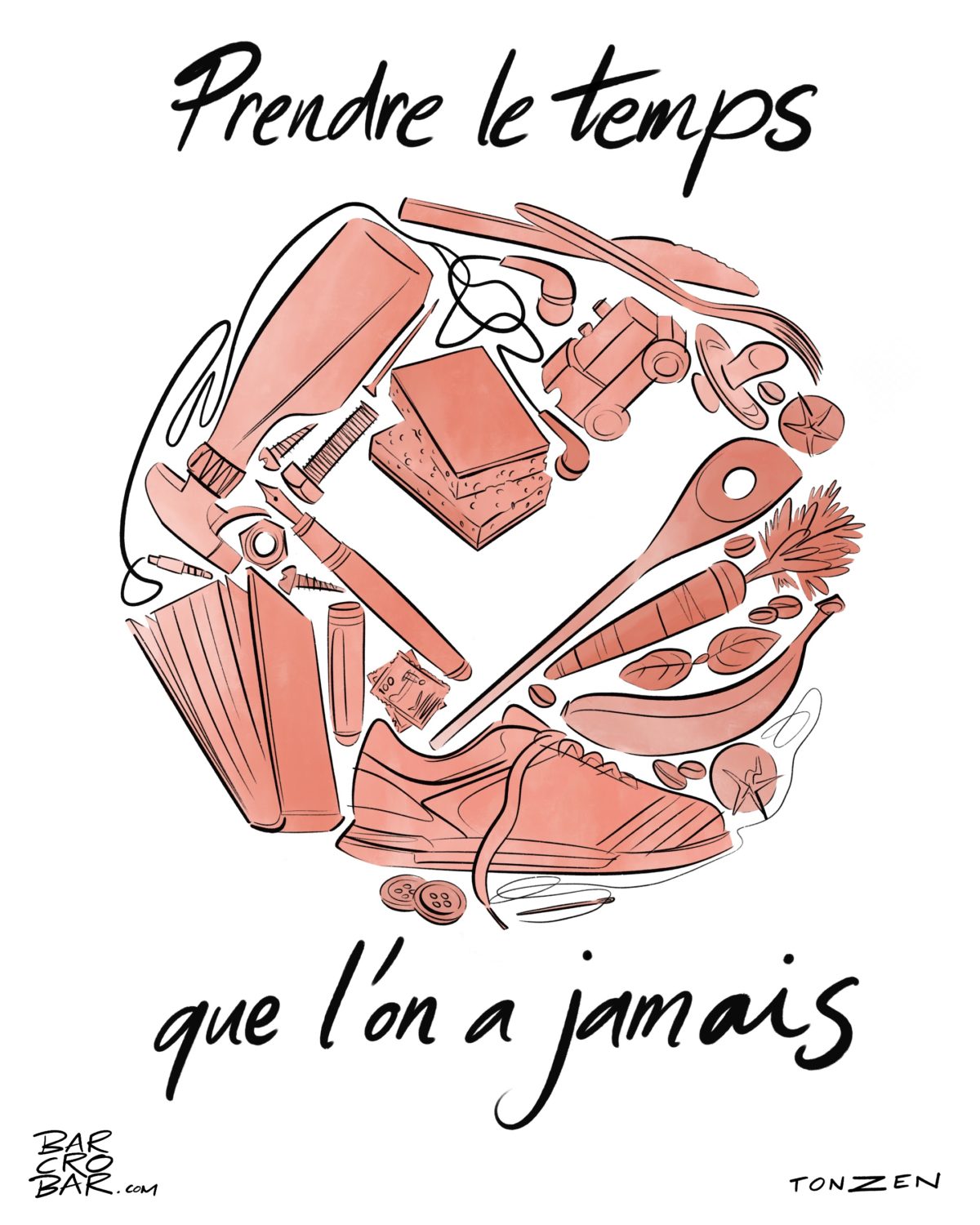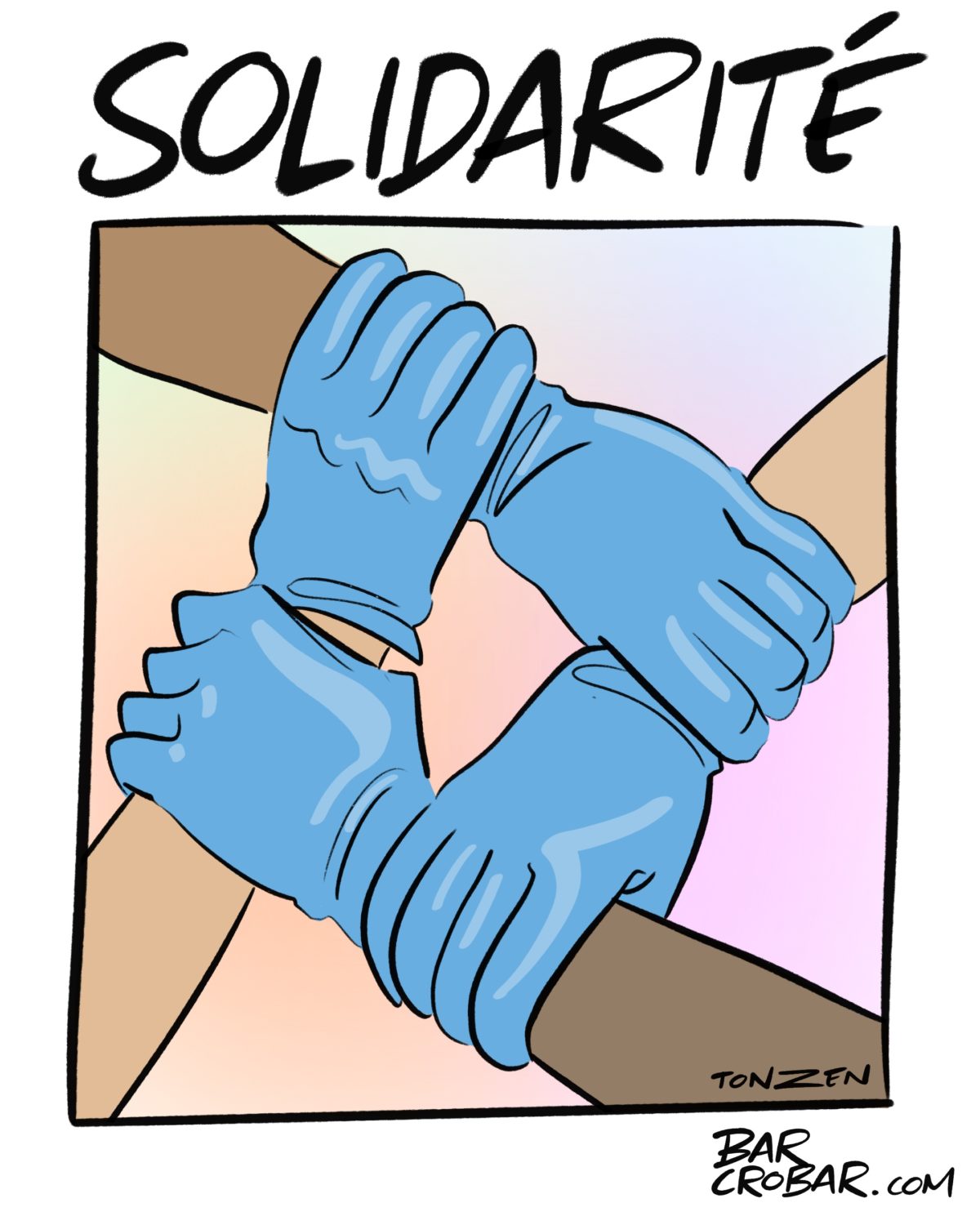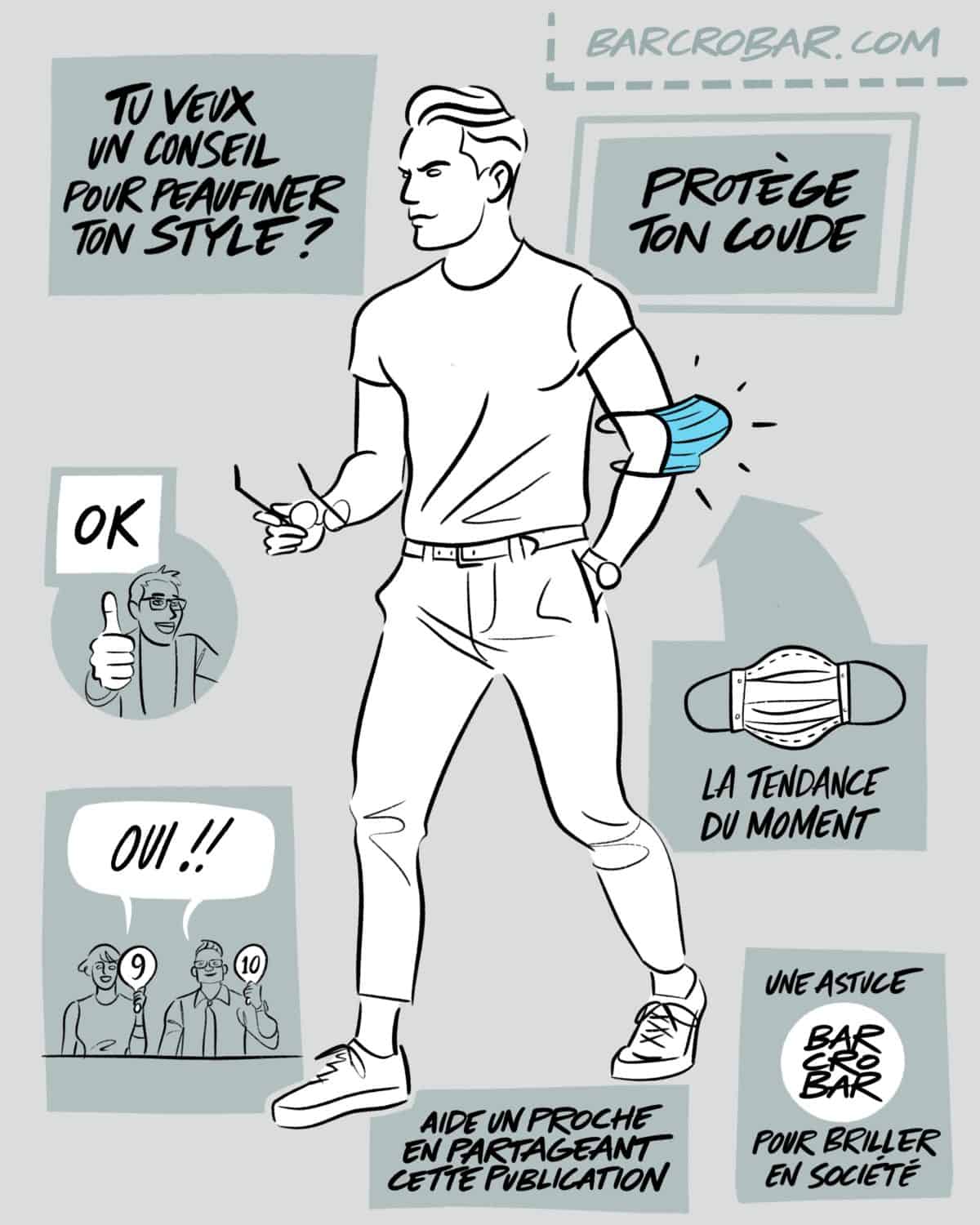Tag: Coronavirus
In France, it will be compulsory to wear a mask in enclosed public places from "next week".
French Prime Minister Jean Castex said on Thursday that the measure would come into force on 1 August.

The decree making it compulsory in France to wear masks in enclosed areas open to the public will come into force "next week", French Prime Minister Jean Castex announced to the Senate.
"We were planning for these provisions to come into force on 1 August", said the Prime Minister. "I understand that this deadline was too late (...) so the decree will come into force next week", he said during his general policy statement to the senators.
"An effective prevention and protection measure".
"Wearing a mask is an effective preventive and protective measure, along with observing barrier procedures", he stressed.
Emmanuel Macron's announcement on 14 July that it would be compulsory to wear a mask in "enclosed public places" from 1 August had pleased those who advocated this measure, but they were calling for it to be applied without delay, including in the workplace.
Jean Castex pointed out that "in so-called professional premises, this implies a change in the health protocols governing the activities concerned".
By APF LE TEMPS
"The first person to catch the virus at the party gets paid".
Young Americans took part in a series of corona parties. The aim of the game? Invite infected people to a party, catch the virus and win the lottery.

The United States is still reeling from the first wave of the coronavirus epidemic, and the number of cases is rising rapidly in some states. Short confinements, too few restrictions, regions affected one after the other - there are many reasons for this.
To which we can add recklessness and stupidity. A group of young people in Alabama have reached a milestone in this area by deciding to organise "Covid-19 parties". The concept is very simple: "Invite as many people infected with the coronavirus as possible. The first person to catch it also gets paid! To collect the prize money, the "lucky one" has to go and have his or her infection confirmed by a doctor. He then receives the money for the tickets to the famous evening.
"They can bring the coronavirus home".
It's hard to imagine the motives of the people involved in this dangerous game. When informed of the existence of this type of party, the authorities in the town of Tuscaloosa didn't believe it at first: "We thought it was a rumour before carrying out any research. But the doctors' offices and the State of Alabama received the same information as we did", explained to CNN Sonya McKinstry, from the city council.
Worse still, this is not an isolated phenomenon. Several similar "private parties" are reported to have taken place in towns in this southern US state. "I'm furious that such a serious and deadly virus should be treated in this way. It's not just irresponsible, they can bring the coronavirus home and contaminate their parents or grandparents", she continued.
The city has therefore decided to sound the alarm, and police checks will be stepped up. Since the beginning of the health crisis, Alabama has recorded more than 39,000 coronavirus infections and almost a thousand deaths.
by Thomas Holzer/L'essentiel
DECONFINING On the dancefloor, the anger!
Ten days ago, Swiss nightclubs were able to reopen their padded doors. But the conditions, in particular the reduced opening hours from 6pm to midnight, have caused some people to cringe. Some clubs are standing firm, believing the measures to be inadequate, not to say absurd.

Saturday evening, 6.30pm. At the D! Club, the disco balls are already shimmering. Behind the turntables, a masked DJ is churning out hip-hop hits, but the dancefloor is still empty. This weekend, like many other nightclubs in French-speaking Switzerland, D! reopened its doors for the first time under the restricted opening hours required by the Federal Council - from 6pm to midnight.
After the reception and security staff had taken their temperature (using a contactless thermometer), and checked that they had downloaded the traceability application required by the establishment, the first revellers trickled in. Three foreign students who had come to celebrate a birthday timidly took to the dancefloor, soon to be joined by a group of friends, determined to take advantage of the free entry until 7pm - and to enjoy the evening. It doesn't matter how small the crowd, I've come to dance, I've missed it," says one young woman between songs. What I'm really looking forward to is getting back to normal.
Alternative plan
But "normal" is not exactly the word nightclub professionals would use. Since the Confederation authorised the reopening of nightclubs on 27 May, many have been complaining that the conditions under which they are being reopened are unacceptable and even dangerous.
See also our editorial: Deconfinement: relaxation subject to conditions
At first, the 2m distance between each dancer was strongly criticised - how could the soul of clubbing survive it? - before being relaxed. PromoterSuisse, the umbrella organisation for music event promoters, took the initiative and drew up an alternative protection plan (neither approved nor rejected by the FOPH), which was adopted by most establishments. As well as maintaining social distancing (drinks can also be consumed standing up), the plan requires the data of 300 party-goers to be collected at the door - they will thus be warned if a case of Covid-19 occurs within 14 days, and potentially subjected to quarantine. Some of the clubs are refusing to be tracked and are putting up a fight. And let's not forget the most controversial issue: the midnight closing time. Can night owls really be motivated to go out earlier?
Postponing the problem
"There's no way it's going to work when it's warm and sunny," says Thierry Namer, Folklor's manager. If the club, located on the Place de la Riponne, sold out when it reopened on 6 June, it's because it was able to count on fans of electronic music, its speciality, but also on the gloomy weather, he believes. "When the weather's fine, people will logically prefer to go out and play sport or meet their friends on the terrace at these times. So despite ourselves, we're becoming competition for bars and cafés.
Competition is not always welcome. In Geneva, the Baroque Restaurant, for example, has partially resumed service, but not the affiliated discotheque on Place de la Fusterie: the new opening hours would require a change of concept, points out the group's general manager, Julien Torrado. "Modify our menu by offering dishes, but also change the prices, because drinks are traditionally more expensive in a club."
Reservations, frustrations, incomprehension too. Like that of Thierry Wegmüller, a member of the Rencontres La Belle Nuit committee, which works to improve the quality of nightlife in Lausanne. The man who also runs the D! Club and ABC is convinced that closing at midnight only postpones the problem. "In reality, clubbers go out in frustration and continue to party on the public highway or at private parties, where there is no sanitary framework. This leads to complaints of night-time disturbance, as was the case in Geneva on the opening weekend," he notes. And when you see that the casinos have reopened until 3am, with thousands of people lining the streets, there's something irrational about these measures.
"Lack of confidence
Thierry Wegmüller, like other nightclub managers, regrets a lack of listening and even consideration from the nightlife world. "We have a tendency to blame them for all the ills, but we shouldn't underestimate our social role. There's a real need among the population to get out and about, and without the festivals this summer, I think it will go from strength to strength."
Some simply denounce a lack of knowledge of the industry. "Why the midnight limit? Perhaps they have the impression that we have orgies from 1am onwards," quips Zabou Elisabeth Jaquet, co-president of the Grand Conseil de la Nuit, an association promoting nightlife culture in Geneva. "We don't understand this lack of confidence, given the prevention efforts our members put in place throughout the year." All of its members - some twenty bars and clubs, including Audio, Usine and Chat Noir - have decided to remain closed.
Another complaint is the ten-day delay between the Federal Council's announcement and the actual reopening of the clubs. "This gives very little credit to the organisation of our events. A good programme takes several months to prepare," adds Zabou Elisabeth Jaquet. Live music concerts, in particular, have become complex to organise in view of cancelled tours. "For our members, it simply didn't make sense to open now," she sums up.
Financial pressure
For others, despite the acrobatic conditions, relaunching the machine is a question of survival. It's a way of mopping up the fixed costs that continue to fall. All the more so as, depending on the canton, nightclubs do not receive any subsidies. "In Fribourg, because they are set up as SA or Sàrl, the clubs are not considered to be part of the cultural world. Yet we have a programme, DJs and comedy shows," points out Stéphane Jaton, manager of the Crapule Club. A request for financial support, in conjunction with other establishments in Fribourg, has so far gone unanswered.
Their hopes are now pinned on the announcements on 24 June, which could include a potential easing of the measures. For Stéphane Jaton, however, there is no question of waiting until then to revise his formula: the Crapule Club will offer a cocktail bar in the greenery of a park all summer long.
Source: Le Temps Virginie Nussbaum
Llama antibodies could help defeat coronavirus
The plasma of a young Belgian llama contains special little antibodies. These are capable of neutralising infection by coronaviruses responsible for SARS, Mers and Covid-19.

Winter is a lama grazing peacefully in the meadows near the city of Ghent in Belgium. The young camelid could also play a key role in the search for a new animal. treatments for Covid-19.
Indeed, Winter has been immunised with a infusion containing proteins surface protein (protein S) of two coronavirus the Mers-CoV and the Sars-CoV-1. Scientists have identified the plasma du lama des petits antibodies neutralising agents that proved effective against two pseudotyped viral particles (a lentivirus modified to express coronavirus surface proteins) mimicking the two strains of coronavirus against which Winter has been immunised, as well as the Sars-CoV-2.
The results of this study will be published in the journal Cell. A preliminary, peer-reviewed version is available from already available.
Small neutralising antibodies
These particular antibodies are a subclass of camelid-specific IgG called VHH. They have only one heavy chain, whereas conventional IgGs have a light chain and a heavy chain. VHHs therefore have only one variable domain, located on the heavy chain.
Crystallographic analysis was used to determine which part of the virus reconstituted HHV from Winter's plasma bind: the receptor binding domain (RBD) of protein S. Several studies have demonstrated their neutralising action against Sars-CoV-1 and Mers-CoV in cell cultures in vitro. One of them, VHH-72, is capable of neutralising infection by the viral pseudoparticle mimicking Sars-CoV-1, as well as that mimicking Sars-CoV-2.
Smaller than conventional IgGs, VHHs are stable and could be administered via a spray to be inhaled, in particular to treat respiratory infections. Scientists hope that the neutralising capacity of llama HHVs makes them serious candidates for treating Covid-19.
Everyone is exasperated by the lightness with which "crazy" Bolsonaro treats Covid-19 in Brazil
The President, described as "the enemy of the people's health", has opened up a real institutional crisis in Brasilia with his irresponsible and repeated rhetoric against the legislature and state governors.

Brazilian journalist, writer and documentary-maker Eliane Brum, who was interviewed by the French weekly Politis translated! "To control the pandemic, we need to put up a barrier to Bolsonaro." "Denial, crowd bathing, contempt for his own government, bluster", in the face of the pandemic, this "anti-statesman is overstepping all bounds". We're dealing with "a madman".
It's a fact: 65-year-old President Jair Bolsonaro's opposition to "mass" confinement of the population in the face of the spread of the coronavirus has been greeted in Brazil with a chorus of boos and criticism from political figures - including some of his allies - and health circles. Agence France-Presse (AFP) reports that they are all crying "irresponsibility", even though he boasts daily about his action on Twitter and Facebook.
In a solemn televised address on Tuesday evening, he defied all the WHO's recommendations, criticising the "scorched earth" policy of some states and municipalities, which are urging people to stay at home and "endangering Latin America's leading economy". He also urged local authorities to "abandon the ban on transport and the closure of shops".
Once again, this is a way of playing down the coronavirus crisis, in the eyes of Courrier international. His vocabulary is aggressive, particularly towards the media, whose "hysteria" he criticises, having recently called them "rotten". A "media trick, says Guardian, that Covid-19! Although he had finally decided to collaborate with the governors of the states and agreed to pay them federal aid to help them deal with the health crisis and, ultimately, the economic crisis caused by the coronavirus, the President abruptly backtracked, "radicalising his rhetoric".
"If there's only one left", it will be this one: Jair Bolsonaro. "The far-right president [...] is in resistance against the whole world, but in particular the Chinese, the media, the left and the ecologists. As far as he is concerned, they are the ones spreading these rumours about the coronavirus, which are transmitting unnecessary panic to the population, and which risk undermining his economic recovery plan... Bolsonaro is in the process of surpassing his master Trump in denial", says Franceinfo:
Coronavirus: Coordinated, three-stage decontamination
VIRUS: Berne presented a timetable for the relaxation of measures on Thursday. The first phase of the plan will begin on 27 April.

The Federal Council intends to resolve the Covid-19 crisis in three stages. Hairdressers, physiotherapists, garden centres and doctors will be authorised to reopen from 27 April. The measures on gatherings will be maintained until 8 June.
"The measures taken have borne fruit, slowing the spread of the epidemic and gradually easing the situation," Swiss President Simonetta Sommaruga told reporters in Bern on Thursday. "The transition is beginning. But it will be slow and gradual, so as not to wipe out the results achieved so far", added Health Minister Alain Berset.
The health of the Swiss population is the Federal Council's top priority. For the time being, the rules in force to combat the coronavirus remain in force, insisted the Health Minister. Gatherings of more than five people are still prohibited. Vulnerable people must continue to stay at home. And teleworking is recommended.
Protection measures will be relaxed from the end of April. Planned to be implemented in three stages, from 27 April, 11 May and 8 June, they can be adjusted depending on how the epidemic develops, according to Alain Berset. "We need to strike a balance between coming out of the economic crisis and the risk of relapsing into a health crisis", said Guy Parmelin, the head of the Swiss economy.
Hairdressers and doctors first
Hairdressers, physiotherapists, garden centres, crèches and other service providers will be the first to be allowed back to work. Hospitals and doctors' surgeries will once again be able to carry out all operations and offer all their services, including those that are not urgent.
These activities involve very little direct contact and do not involve large flows of people," explained Mr Berset. In addition, protection plans are easy to put in place. The cantons will have to monitor their implementation.
From 27 April, food shops selling other goods will be able to reopen their entire sales area. In the opinion of the Fribourg resident, it may be necessary to wear a mask to accompany the gradual reopening.
In addition, people outside the immediate family of the deceased will once again be able to attend the funeral.
Schools from 11 May
From 11 May, the Federal Council plans to reopen compulsory schools. The youngest children do not catch the disease and are poor vectors," said Mr Berset. Other shops (sports and others) and markets will be able to resume their activities.
In a third phase, scheduled to start on 8 June, vocational schools, upper secondary schools and universities should reopen their doors. Mr Berset explained that these students would have to travel a lot more.
On the same date, entertainment and leisure facilities such as museums, libraries, botanical gardens and zoos should reopen. The ban on gatherings will also be relaxed. The government is due to decide on the details of this step on 27 May.
Restaurants and bars in limbo
Many other points remain unresolved. The government does not mention any date for the reopening of restaurants and bars. The catering industry can draw up plans for a gradual opening," said Sommaruga.
It is also impossible to give a deadline for the major events. "Expectations are very high for this summer", admitted Mr Berset, but the Federal Council needs a global vision beforehand.
The transition from one stage to the next will only take place if there is no significant increase in the number of Covid-19 cases.
Resuming transmission monitoring
As soon as the number of new infections drops to around 100 a day, the cantons will start systematically tracing the chains of transmission again. To do this, they plan to step up screening, devise a contact-tracking strategy and develop an application that will make it possible to find out if someone has been in contact with an infected person.
Finally, because of the epidemiological situation, the Federal Council has authorised the canton of Ticino to extend the restrictions in certain sectors of the economy until 26 April.
The Federal Council's measures to combat the spread of the coronavirus and protect particularly vulnerable people are taking effect. The Conference of Cantonal Health Directors (CDS) considers the phased relaxation presented by the Federal Council on Thursday to be viable.
To ensure that medical establishments are not overwhelmed, it will only be possible to exit in measured steps, the CDS said in a press release. This protection is paramount, even if the relaxation must also take into account the economic and social effects.
CDS believes it is important to separate each stage by an interval of at least a fortnight. This is the only way to see the effects of relaxation on the number of new infections. It is just as important to continue observing hygiene measures and distance rules.
source: ats / Lematin.ch
TOP 17 things you can finally do during confinement
lepetitjournal.com has put together a list of all the things we want to do but never do because of lack of time, lack of motivation or an illness that affects us all: 'la flemme-ingite'. Whether you're cooped up in France or abroad, this is the perfect time to change your bad habits.

Anyone who's never said to themselves "I'll do that as soon as I've got time" or "Come on, I'll do it tomorrow" and then, when the time came, found themselves lounging in front of Netflix, forgetting what they'd promised themselves they'd do. Containment is there to help you stay on top of these activities, and we're here to remind you.
Since we're all going to be confined to our own homes, you might as well make them shine!
Cleaning your home
The big piece of furniture in the hallway that hasn't been moved for so long that you're afraid you'll fall asleep counting sheep behind it - yes, that one and all the others will be part of the biggest clean-up you've ever done in your home sweet home. After all, you're better off in a clean house!
Tidying up your cellar/attic/garden shed
Things pile up in a chaos that only you can understand. Let's not even talk about the times when you've been pissed off to find the cat's cage in this nameless mess. So summon up your courage - or four, if you're confined to more than one room - and turn that storage room into a clean and tidy place. orderly. This will boost your morale and get you through the day without you even realising it.
Sorting your clothes
Would Marie Kondo turn a blind eye to your cupboards and do you struggle every day to know where your things are and what you can put in them? Empty your cupboards, sort and re-sort like "The Art of Tidying". Choosing your outfit for the day will (re)become a real pleasure, even if it's just to put on a cozy outfit for your telework.
Finally time to deal with digital clutter
Sorting your photos
Those 384 gigabytes of photos that you still haven't been able to give up, lying dormant in your last three phones, deserve to be set free. What better way to lift your spirits than to " scroll " memories and choose cnuggets to decorate your walls or create photo albums? There are a number of applications for printing your photos from your phone, including Lalalab, Cheerz, Photobox and Mon AlbumPhoto.
Looking after your e-mails
Have you ever noticed the incredible number of e-mails you've accumulated over the years and your inbox is almost full? In just an hour and a few clicks, you can lighten the load.
Backing up your computer/phone
The coronavirus has reached the whole planet, and you can protect yourself against it with a few simple barrier measures. But you know that if a virus reaches your computer, you'll be left with nothing but tears in your eyes. It's time to get ready and finally make a backup of your device.
A healthy mind in a healthy body
Stoves, a new pleasure
Be creative! We know that in these difficult times, shopping and stocking up can be complicated. Sometimes you have to fall back on tins or foods that seem to have always haunted your cupboards. So why not consult your recipe books or the internet to find some new recipes to make the most of them? Top Chef is there for you! Confinement doesn't mean bad food or nibbling. Learn to share the cooking and enjoy the flavours. Who knows, it might even become a new habit, which, much to your surprise, doesn't take that long.
Get back into sport
For those who have always said to themselves: tomorrow I'm going to the gym! Now you can finally do sport at your own pace, without the pressure of watching Mr Muscles lift 50kg with his little finger. Find a programme to do at home and follow a little routine to get you going without any pressure. 15 days (for the time being) without running behind the metro wasn't the 'must' for getting into shape anyway.
Start meditation and/or yoga
Why not take advantage of this moment of confinement to refocus? Meditation or yoga are the perfect way to escape the panic. The lack of courses on YouTube won't stop you. Don't have a yoga mat? Your living room mat or a couple of towels on the floor will do the trick. Remember the Thai teenagers trapped in a cave who practised mindfulness meditation for a fortnight? Now it's your turn! Several scientific studies have shown that this practice has positive effects in treating a number of illnesses such as depression and anxiety.
Creativity is the name of the game!
Now that you've tidied up your cellar, you're bound to have some treasures to customise.
Tutorials on Pinterest, Youtube and other social networks will be your best allies.
Creative activities with and/or for your children
All these tutorials on social networks, from decorating to repairing to building... have always made you want to. All your child wants is your attention. So now's the time to make that puppet theatre or fort you've been dreaming of for months (why not a Game of Thrones-style toilet paper throne?).
New games for your pets
The confinement also has repercussions for Garfield, who is no longer king of the house while you're at work from 9am to 6pm. And if you try to explain to Medor what teleworking is, you'll end up in a scratching session. You can create new games using plastic bottles or egg cartons and put kibble inside, for example. You can also use cardboard to build a new kennel or cat tree.
Keeping a diary/notebook
You've always thought that getting organised with a vintage, well-decorated notebook would be nicer. There's nothing like creating a Bullet Journal and scribbling down your moods in it instead of taking it out on your partner, who's also on the verge of a nervous breakdown during this confinement. According to a study by the American Psychological Association, those who take five minutes each evening to write down their to-do list fall asleep faster and sleep better. The most ambitious may even start writing that novel you've been thinking about for all those years. So get out your best pens!
Culture in your home
Start reading again
Your bookshelf is full of books that you bought thinking "I'll read it on the train/plane/carpool/bus/waiting room/...". Make the most of your relaxing time to finally start and, above all, finish those books whose covers have caught your eye but you haven't yet decided to turn the pages.
Visiting museums/galleries
Cultural activities often fall by the wayside in our daily lives. But with new technologies, we can now visit these places from the comfort of our sofa. You can virtually enter museums such as the Natural History Museum in Washington, the Mapfre Foundation at the Musée d'Orsay in Paris or the National Gallery in London.
Use your beauty products
You've got creams dating back to 2003, and "cocooning" products that have never been opened. Your new objective: empty them. Use that eco-friendly soap that's good for your skin, hair and nails that your mother-in-law gave you three years ago, and that scrub you've forgotten you had.
Make yourself beautiful
Does your beard or hair need a new cut? Improvise yourself as a hairdresser for yourself or your family. You'll have at least 15 days to grow it back if you mess up!
But above all, relax!
Run yourself a nice hot bath. Add a small glass of wine. Get out those candles you only want to light for special occasions. Listen to some music and relax. The world will continue its mad rush, but at least you'll be able to put it on hold for a few minutes. As for the rest of the time, don't forget to consult our site for all the essential information.
Coronavirus: After confinement, the Chinese are running for divorce.
Many couples did not survive the quarantine: since the end of confinement, the whole of China has seen a sharp rise in divorce petitions.

At the epicentre of the health crisis that has spread throughout the world, China is finally seeing the light at the end of the tunnel. But the long quarantine imposed on the country's inhabitants will leave its mark: it seems that many couples have not been able to resist living in close quarters. According to the "Global Times", quoted by the media Sup ChinaSince the end of confinement, the number of divorce applications has soared across the country.
"Because of the epidemic, many couples were locked in their homes for more than a month, awakening underlying conflicts", confirms an official from Shaanxi province. Reopened on March 1, some marriage and divorce registration offices have never seen so many applications, writes ulyces.co. And Chinese people wishing to end their marriage will have to be patient: waiting lists are getting longer in some regions, and you will have to wait several weeks before your application is processed.
Young people are rushing around
We've had people come to us who wanted a divorce but very quickly regretted it. Some young couples have even decided to remarry while their divorce certificate was still being printed", says another Chinese government official.
The news came as no surprise to Chinese internet users, who believe that many couples have not withstood the series of trials imposed by the health crisis. "When people spend day and night together, it's hard to hide or forget the problems in the marriage", commented one user on the Weibo social network. Among the factors causing tension, Internet users mention the sudden interruption of a well-oiled routine, economic stress, anxiety or even depression. Others think that an imbalance in household chores may have done the damage.
Will this phenomenon also be seen in Europe? The answer in a few weeks' time.

A growing number of solidarity initiatives in French-speaking Switzerland
Coronavirus Throughout the cantons, the Swiss are setting up systems to help neighbours, the elderly and relatives.

In French-speaking Switzerland, solidarity actions are multiplying between neighbours and on social networks. Help is being offered to the elderly and parents in particular. Some people are offering to lend a room to cross-border nursing staff.
In Geneva, there are an increasing number of advertisements in apartment blocks from residents offering to help their elderly neighbours. A Facebook page dedicated to self-help in the canton and the region was set up at the end of last week. By early afternoon on Tuesday, it had more than 7,700 members, who are indicating what they can do and where, from Thonon-les-Bains (F) through Geneva to western Lausanne.
Members mainly offer to do the shopping or go to the chemist, less often to look after children, walk a dog or drive someone, or even to lend a room to border carers to avoid having to travel, Keystone-ATS' regional offices found.
Posters in the canton of Vaud
In the canton of Vaud, posters are also springing up offering to put one's name down to help an elderly person in a practical way. While there are a number of individual initiatives, it is above all the Pro Senectute organisation that has launched the "Stronger Together" concept.
"The idea is for people to show their solidarity and be available in a building to help a senior citizen," explains Tristan Gratier, President of Pro Senectute Vaud. The association's 600 volunteers in Vaud have put up several thousand of these posters, particularly in the canton's solidarity villages and neighbourhoods.
On social networks, many sharing initiatives are springing up, particularly for families and childcare.
Cyclists mobilised
A number of support groups have sprung up on Facebook in the canton of Neuchâtel. The Solidarité neuchâteloise group, the largest, has over 3,000 members. Originally set up to support parents and children, the page receives many proposals for transport or food purchases.
The self-employed are also mobilising: a petition to save Neuchâtel's businesses has already collected more than 1,500 signatures online in less than two days.
In Neuchâtel's capital, the Black Office, which normally helps private individuals repair or maintain their bicycles, is offering to deliver books from a local bookshop and goods from a cooperative of regional producers free of charge by bike from Wednesday.
Gestures for rents
In Martigny (VS), patron Léonard Gianadda has decided to make a gesture totalling CHF 80,000 to the residents of his 430 flats. They will be offered a reduction on their April rent of between CHF 100 and 250, depending on the size of the flat.
In St-Maurice (VS), the Sisters of Saint-Augustin have sent a letter to the tenants of their housing association, with a 100 franc note inside, to reduce their next rent. On Facebook, the group "Monthey, Notre ville" has a list of people who are willing to help people who have been confined to their homes.
Fribourg basketball player reconverted
In the canton of Fribourg, young people are offering their services to look after children, both within their own families and beyond, for a small fee or free of charge. According to La Gruyère, one student has a full timetable until the end of April. The tri-weekly also mentions the initiative of Fribourg Olympic basketball player Boris Mbala. He has also made himself available for baby-sitting.
In the Jura region, Delémont is offering an information and self-help portal for service providers and people who are vulnerable or obliged to stay at home. The website lists shopkeepers who offer home deliveries, people offering childminding services and market gardeners who do not have markets but still have vegetables available.
In Moutier (BE), the municipal council has set up two community services: a shopping delivery service and a childcare service. Residents of the Prévôtôt who can provide this kind of community service can sign up.
In addition, an operation to support nursing staff got underway on Sunday evening in French-speaking Switzerland. At 9pm, some residents began clapping from their windows and balconies. Originating in Italy, the action, known as "minute applause", is due to be repeated every evening and is likely to grow over the coming days and weeks.
source: ats 24 Heures

